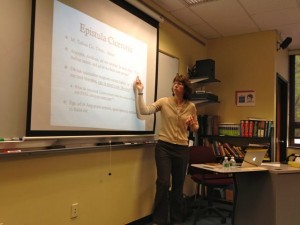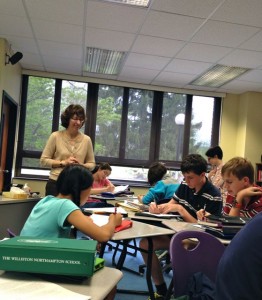 When it came to Roman slaves, Emily Vezina’s Middle School class wanted to know all the details: Did a freed slave have a better life? Were slaves ever paid? What was the reason why a master might free a slave, anyway?
When it came to Roman slaves, Emily Vezina’s Middle School class wanted to know all the details: Did a freed slave have a better life? Were slaves ever paid? What was the reason why a master might free a slave, anyway?
“Boy, you guys have good questions,” said Teresa Ramsby, who was visiting from the University of Massachusetts Amherst last week. “These are tougher than my college students.”
Ms. Ramsby, an associate professor in University’s Classics Department, spent a period with Latin I class, talking about manumission in the Roman world.
Did freedom from slavery mean a great life afterward? That depended, she said. Freed slaves were paid more, but they also owed their master money for the room and board they’d been given as a slave. They couldn’t vote, but their children were completely free.
Some slaves, Ms. Ramsby noted, continued to work for their masters even after they were free. She gave the example of the scribe Tiro, who not only worked for his powerful master as a freed slave, but preserved and published the many letters of that master, Marcus Tullius Cicero, after Cicero died.
 “Students got to ask some of their burning questions and learned a lot from the experience,” Ms. Vezina wrote later in an email about the visit. “Her presentation was great with activities, plenty of information, time for questions, etc.”
“Students got to ask some of their burning questions and learned a lot from the experience,” Ms. Vezina wrote later in an email about the visit. “Her presentation was great with activities, plenty of information, time for questions, etc.”
Ms. Vezina, who first learned about Professor Ramsby and her work on Roman society, including her new book, Free At Last!: The Impact of Freed Slaves on the Roman Empire (2014), through a local family, said she’d like to invite Professor Ramsby back next year.
“I definitely plan to take advantage of her expertise,” she wrote.
As a final exercise of the class period, Professor Ramsby had the Middle School students translate one of the letters from the “Epistula Ciceronis,” Ad Familiares. Students puzzled through the Latin vocab, and figured out that the letter from Cicero offered Tiro his freedom if the scribe recovered from a grave illness.
“This was a pleasure,” Professor Ramsby said after the period had ended. “It’s fun to have a chance to work with younger people.”

